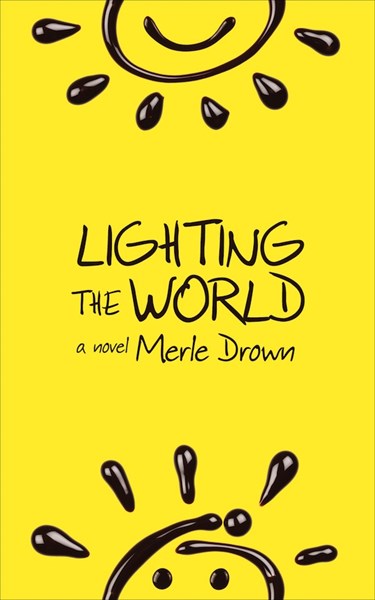MANCHESTER, N.H., April 29, 2015 (GLOBE NEWSWIRE) -- Some novels slide right into the zeitgeist of their times, and some novels have to wait. Count "Lighting the World," the powerful new novel by Merle Drown—who also teaches in Southern New Hampshire University's MFA in Fiction and Nonfiction program—as among those that have had to wait.
"Lighting the World" is based on a December, 1985 New Hampshire school shooting incident, and the manuscript was being shopped by Drown's agent a few years after 16-year-old Louis Cartier had taken two hostages at Concord High School, and then been shot to death inside the school by Concord police.
Drown was teaching English at Concord High at that time. He did not know Cartier personally, but he knew the two boys taken hostage. This was after the success of Drown's debut novel, "Plowing Up a Snake" (Doubleday, 1982). "A spare first novel that commands attention and builds tension like a thriller," said Publisher's Weekly. "A solid, no-nonsense writer," added People Magazine.
Then came this school shooting incident that occurred years before such incidents became all too common. Drown himself was present in the building when Cartier was killed. In the aftermath, the novelist saw in Cartier a boy whose childhood had been much like his own: poor in rural or mill town New Hampshire, something of an outsider at school.
"But I got into college and got out of there," Drown said. "I remember thinking about Cartier and deciding, 'There but for the grace of God go I.'"
Drown also learned enough to suspect that Cartier never meant to hurt anyone—that this was the beginning of a runaway attempt, one in which Cartier hoped for the companionship of the girl he was looking for that day, and that he just panicked when police appeared.
Cartier's story stayed with Drown even as it was immediately eclipsed in the newspapers by another Concord High School tragedy: the January, 1986 death of social studies teacher Christa McAuliffe in the Challenger space shuttle disaster. The speed with which Cartier was forgotten made his story even more compelling to Drown.
"And I made it into a novel, fictionalizing certain elements, because I'm a novelist," said Drown. "That's how I get at the truth."
And yet, once it was done—and despite that chorus of praise for "Plowing Up a Snake"—Drown's agent could not find a publisher for it. "He wasn't sure why," Drown said. "The best theory he could offer was that publishers felt it was too sympathetic to the kid."
Drown was not willing to make it any less so, and finally it went back into the drawer. Drown's actual follow-up to his debut novel was postponed by nearly two decades. But "The Suburbs of Heaven" (Soho, 2000) was another success. "Antic, tender, and bittersweet," said Publisher's Weekly. "Ironically," said the New York Times, "it is the comedy that gives [the characters] stature, and even dignity, as they pick themselves up after each new mortification."
Drown and that novel were picked for Barnes and Noble's Discover Great New Writers series, and fellow novelist John Dufresne added, "At last New Hampshire has her Faulkner."
But unlike Faulkner, Drown hasn't been churning novels out in succession. He joined Southern New Hampshire's faculty in 2006, and has spent the years since "Suburbs" publishing short stories and working on several new—but still unfinished—novels. Last year he decided to try shopping "Lighting the World" among the small presses that his agent would not have looked at in the 1980s.
The manuscript was snapped up by the California-based Whitepoint Press, and on April 16 Drown's story about Wade Rule—a well-intentioned young misfit, an avid hunter who brings his shotgun into school that day because he wasn't willing to leave his most valued possession unguarded—finally hit the bookshelves.
The story is told in a third-person point of view, but is hitched so tight to Rule's perspective that it achieves a stream-of-consciousness effect that would look right at home in a Faulkner novel. "Dark but compassionate," said Foreword Reviews.
"Like a good Greek tragedy, the story moves swiftly and deadly," added John G. Cawelti, author of "Six Gun Mystique." "A wonderful work of art."
"Louis Cartier, Wade Rule—these are the kinds of kids who get lost in our system," said Drown. "Especially during the 1980s, the Reagan years, when being poor was seen as a moral flaw."
Of course the novel itself got lost in the system during the 1980s. Today—after decades of so many subsequent shooting incidents, sometimes by determined murderers and sometimes by police—we might be ready now to look closely at one of the first such incidents, and wonder about what we missed.
"All such stories come with gaps that perhaps can only be filled in by a solid, no-nonsense novelist," said Richard Adams Carey, a nonfiction writer also on the faculty at Southern New Hampshire University. "This indeed might be our best way of getting at the truth."
Photos accompanying this release are available at:
http://www.globenewswire.com/newsroom/prs/?pkgid=32527
http://www.globenewswire.com/newsroom/prs/?pkgid=32528
Lost In the System/ "Lighting the World," the new novel by Merle Drown, is actually an old novel, one that explores the mysteries of what has become a familiar sort of tragedy.
| Source: Southern New Hampshire University MFA and Creative Writing

